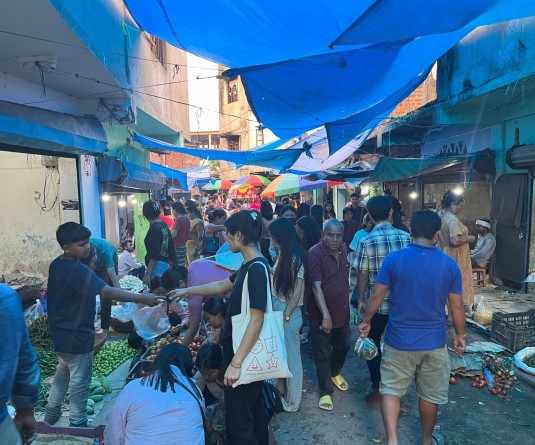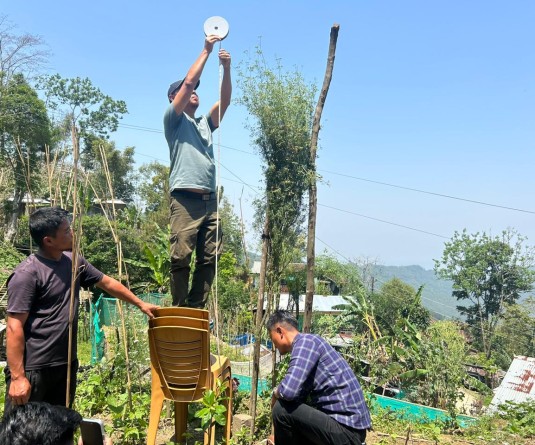
Morung Express News
Dimapur | September 13
The alleged increase of ‘illegal immigrants’ from Bangladesh via Assam and Dimapur has become a worrisome issue in Wokha district. It is rapidly changing the commercial landscape in the district.
As the issue continues unabated and in a larger scale, the locals, apprehensive of seeing Wokha turn into another ‘Dimapur’ are gathering their wits to grapple with the situation even as the efforts to prevent the ‘illegal immigration’ remain highly inadequate.
In Wokha town, the residents testify that the presence of ‘illegal immigrants’ has increased, and many of them are now engaged in various commercial activities. Over the years, a large number of people have reportedly migrated for both long and short-term employment to this part of Nagaland state.
Slack border check gates
All this is happening when Nagaland is protected by the Inner-Line Permit (ILP) system which restricts non-locals (Indian citizens from other states) access to other parts of Nagaland, except Dimapur. It is alleged that most ‘illegal immigrants’ enter the state using bogus documents.
With the main entry either from Dimapur and Merapani side of the border - questions arise on how effectively the border check gates for ILP are being monitored.
An officer from the Intelligence Department, Wokha on condition of anonymity admitted that one of the main factors for the increase of ‘illegal immigrants’ would be the slackness of the personnel manning the border check gates.
“Most of the time, ILP defaulters are released after charging some amount as ‘bribe’ instead of registering the case under the Bengal Eastern Frontier Regulation, 1873 and forwarding them to judicial custody,” the Intelligence officer revealed.
Besides, Wokha district has the longest stretch of border with Assam and infiltration is as easy as it gets. Lotha Hoho vice chairman speaking to The Morung Express S Mhonlumo Odyuo suspect that the influx of the ‘illegal immigrants’ may mostly be from the Merapani side of Assam.
The Nagaland police check gate which was earlier located at Merapani has been relocated 3 kilometer into Nagaland. Now the check gate is erected at Bhandari sub division inside Nagaland, which the Lotha Hoho points out, gives ample opportunity for ‘illegal immigrants’ to saunter inside without much ado.
The local connection
Another contributing factor to the influx, which NGOs from Wokha points their finger is the bringing in/hiring of labourers from Assam for construction purposes by contractors and landowners after obtaining permit chit/gate pass from the district administration. This comes as a “golden opportunity” to gain entry into the district.
“Those illegal migrants who enter the district as construction workers and labourers with specified duration of stay do not go back and form a bulk 0f their people making a colony in the district,” Wokha District Chamber of Commerce and Industries (WDCCI) general secretary, S Abenthung Ngullie revealed.
The Lotha Hoho vice chairman added that often it is more than the specified number of labourers, mostly illegal immigrants as directed in the permit order that makes their way inside the border.
As per the estimates of the WDCCI, at least 30-40% of the businesses in Wokha town are run by suspected ‘illegal immigrants.’ They are more prominent in the construction business consitutitng an estimated 80% of the skilled and unskilled workers.’ The figure appears to be staggering even as WDCCI general secretary points out that it could be more.
In a comparison, the Hindu community in Wokha town, according to census provided by the respective unions to the WDCCI, owns around 40 business establishments, while the Muslim community has more – around 200 but Ngullie stipulated that there could be definitley more.
“It is very difficult to get precise census details, even when it comes to trade licenses. Many of the non locals register their business/trade permits in the name of locals and this confounds the situation more,” Ngullie revealed.
The data, however, could not be independently verified or offical. Such statistics are rarely available since there is no proper mechanism to carry out a clear-cut census.
According to a member of the Wokha Muslim union, they make it a point not to register people of their faith without valid documents of identity into the fold of their union. “We also do not take risk or take responsibility of those people who are not here legally,” the member who hails from Bihar maintained.
Ironically, there are reports abound that the population of Bangladesh origin Muslim in Wokha district is already far larger than Indian origin Muslims.
LSU entrusted to screen defaulters
Realizing the gravity of the situation, the Lotha Hoho said it recently convened an all frontal organization meeting to discuss on the issue of ‘illegal immigrants.’ At the meeting, the house entrusted Lotha Students’ Union (LSU) the task of screening the legitimate from the illegitimate and deport defaulters. “We are taking the issue seriously,” Lotha Hoho chairperson Odyuo stated.
The LSU also introduced a card for registration of non locals in Wokha. The card, according to the student union’s president Libemo M Tsopoe, is issued in understanding with the district administration, frontal organizations and civil societies to formulate accurate census of the non locals and prevent the influx of ‘illegal immigrants’ in the district.
However, keeping a check such census is not easy as they mostly do not come forward to register for the same.
In a move to keep a tight leash on the influx, the LSU president informed that it has verbally informed the DC office to stop issuing new ILP - whether legal or illegal. While this move might invite some criticism, Tsopoe stated that it plans to issue an official representation soon to the district administration to stop issue of ILP without proper documents.
The LSU in the meanwhile pointed out that the students’ union cannot succeed in the assignment alone. “We need the cooperation of all. In addition, we first need to educate our own people,” Odyuo pointed out.




